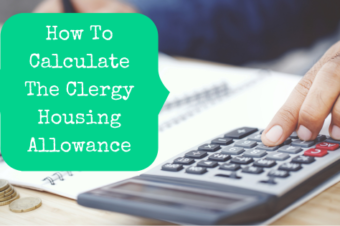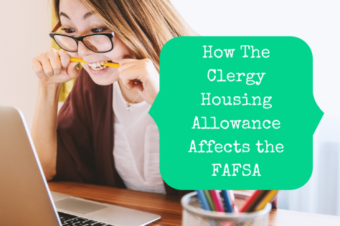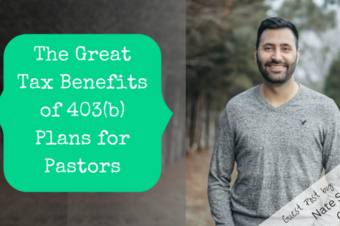
The following is an excerpt from my book, The Pastor’s Wallet Complete Guide to the Clergy Housing Allowance:
The IRS says it’s still possible to claim a housing allowance even after you retire and stop receiving a paycheck. Unfortunately, there is no clear law or hard and fast rules about this. There is little guidance and not a lot of certainty, so what we do know is cobbled together from various Revenue Rulings issued by the IRS.
Even in retirement, the rules that the housing allowance must be provided as payment for ministerial services and designated in advance by a qualifying organization still apply. Based on the information available to us, this is how those two requirements work themselves out in retirement:
The allowance must be provided in payment for services that are ordinarily the duties of a minister of the gospel. According to the IRS, the housing allowance of a retired minister counts because it is paid as compensation for past services.
Contributions you make to a church retirement plan, usually a 403(b)(9), as a pastor are a part of your pastoral income. So, when you take them out in retirement they are still considered eligible pastoral income. Any pension your church or denomination pays you is something that you earned through your ministerial work and part of your compensation as well. Also, if you use part of your church pension to purchase a commercial annuity, those annuity payments generally qualify for the housing allowance as well, since they were bought with your ministerial income.
You cannot take a housing allowance from an IRA in retirement, even if you used your pastoral compensation to fund it. Neither can you claim a housing allowance from your Social Security benefits, even if you paid into the system as a pastor. I know this is confusing, but that’s just the way the IRS is. Trying to make sense of most tax law is like trying to make sense of a 3-year-old girl. You can learn to live with them but you’ll never actually understand them.
The housing allowance must be officially designated in advance by the employing church or other qualified organization. The IRS has ruled that the board of a national denominational pension fund is qualified to make a housing allowance designation for a pastor. They determined that the pension fund met the requirements of being an “employing church” and the fund trustees were acting on behalf of local churches. Revenue Ruling 63-156 also allows for an independent or nondenominational church to designate a housing allowance for their retired clergy.
The same ruling addressed pastors with non-church employers as well. Basically, if their income while working was eligible for the housing allowance, then their pension or retirement savings from that same employment should also be eligible during retirement. If that employer was able to designate an allowance for them during their working years, then they can do the same during retirement. However, the IRS has ruled inconsistently on this matter, so there is a risk that they would disallow a housing allowance taken from a non-church employer.
As during your working years, the housing allowance still must be officially designated in advance. If you anticipate level housing expenses in retirement, it is a good idea to make your request “until further notice” so that you don’t have to worry about resubmitting your housing allowance every year. For some denominations, the annual conference is responsible for passing the designation resolution for retired or disabled clergy, which is then published in the conference journal. It is not uncommon for them to designate 100% of income as housing allowance.
Another thing that doesn’t change in retirement is the fact that only current year expenses qualify for the housing allowance. This is important for retirees because many senior living facilities either require or offer the option for residents to buy-in or pre-pay with a large one-time payment.
Even if you pay 15-years’ worth of rent at once, you can only claim one years’ worth of rent for your housing allowance. And, if you pre-pay like that, you cannot amortize the payment over 15 years and try to claim a portion of it in subsequent years. We know this because one pastor tried to and the IRS wouldn’t let him. They limited his housing allowance to only the utilities, maintenance and insurance that he paid during that tax year. So, by prepaying housing expenses in retirement (or any time), you essentially forfeit your ability to claim a housing allowance for those expenses that cover more than one year.
IRA Rollovers
One threat to your ability to take a housing allowance in retirement is rolling the money out of the church plan. The common advice among financial advisors when you leave a job, whether to retire or otherwise, is to roll the funds in your employer-sponsored retirement plan into an IRA. This is because IRAs are self-managed and offer more investment options and sometimes lower fees (and some advisors get paid a percentage of them, too).
If you’re a pastor, DON’T DO IT!
That’s right, DON’T DO IT!!!
No matter what your advisor says, keep the money in your church’s retirement plan. At least enough to cover your housing expenses for the rest of your life. If you roll your money out of your church plan and into an IRA in retirement, it will no longer be eligible for the housing allowance. Also, if you roll the money from your church plan into a secular 401(k) or 403(b) it will become ineligible for the housing allowance.
The only chance you might have to reverse such a mistake would be to start working as a pastor again for a church that offers a qualified retirement plan. Then you might have the option to roll your IRA or other retirement account back into the church’s plan. Once the money is back in a church plan, it may again be eligible for a housing allowance. However, there’s no guarantee that the IRS would allow that.
So, I’m going to stick with my initial advice: DON’T DO IT!















